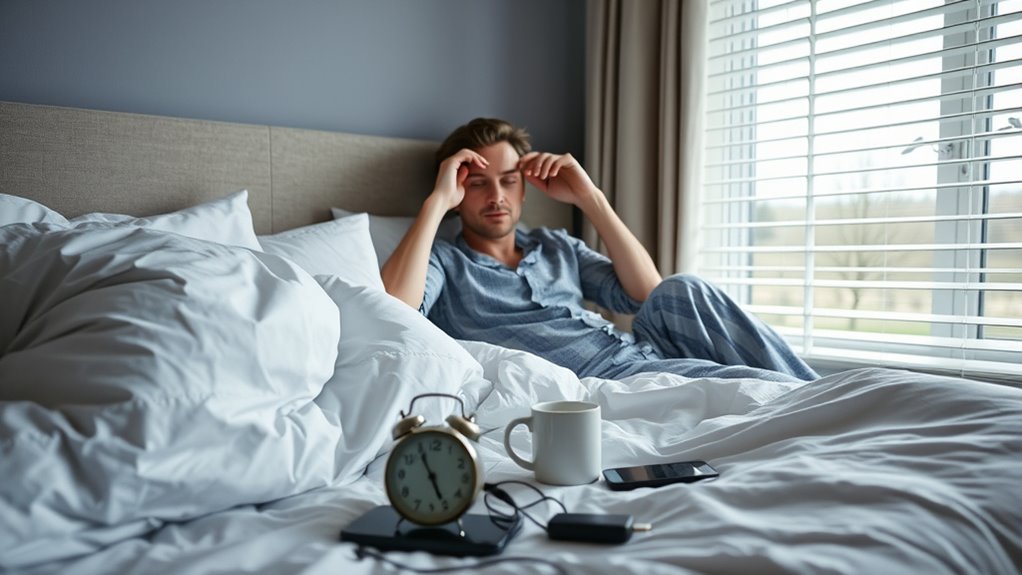Waking up tired can stem from poor sleep habits, such as inconsistent schedules, electronics use before bed, or an uncomfortable environment. Hidden health issues like sleep apnea or hypothyroidism may also interfere with restorative rest. Lifestyle choices, including caffeine intake and stress, can disrupt your sleep cycle. By adjusting your routines, improving your sleep environment, and addressing medical factors, you can wake up refreshed. Keep exploring to uncover more ways to boost your sleep quality and energy levels.
Key Takeaways
- Poor sleep habits and environment, such as irregular schedules and uncomfortable settings, disrupt restorative sleep stages.
- Underlying health conditions like sleep apnea and hypothyroidism cause frequent awakenings and fatigue.
- Lifestyle factors, including caffeine, alcohol, and stress, interfere with the quality and duration of sleep.
- Inconsistent sleep routines and electronics use before bed hinder the body’s ability to relax and rest properly.
- An unoptimized sleep environment, with excessive light, noise, or uncomfortable bedding, prevents restful sleep.
Poor Sleep Habits and Environment

Poor sleep habits and an unsuitable sleep environment are common reasons why you wake up tired. Your sleep hygiene plays a pivotal role in how well you rest. Poor routines like inconsistent bedtimes, using electronics before bed, or consuming caffeine late can disrupt your sleep cycle. Additionally, your bedroom setup influences sleep quality. An uncomfortable mattress, excessive noise, or too much light can prevent you from reaching restorative sleep stages. To improve, establish a consistent sleep schedule and develop calming pre-sleep routines. Make sure your bedroom is a sleep-friendly environment—keep it cool, dark, and quiet. Investing in a comfortable mattress and pillows can also make a significant difference. Using Glycolic Acid in your skincare routine can help improve skin texture and clarity, contributing to overall well-being. By optimizing your sleep hygiene and bedroom setup, you set the stage for more restful, rejuvenating sleep.
Underlying Health Conditions

Underlying health conditions can markedly disrupt your sleep, making you wake up tired even if your sleep habits are good. Sleep apnea is a common issue that causes your airway to collapse or become blocked during sleep, leading to frequent awakenings and poor rest. If untreated, it can leave you feeling exhausted in the morning. Thyroid issues, particularly hypothyroidism, can slow your metabolism and interfere with your sleep cycle, resulting in fatigue upon waking. These conditions often go unnoticed but considerably impact your sleep quality. Addressing underlying health problems is essential; a healthcare professional can diagnose and treat sleep apnea or thyroid disorders, helping you achieve more restful sleep and wake up feeling refreshed. Don’t ignore persistent fatigue—your health may depend on it. Vetted by specialists and supported by research, addressing these issues can significantly improve your sleep quality.
Lifestyle Factors and Daily Habits

Your daily habits and lifestyle choices play a significant role in how well you sleep and how rested you feel in the morning. Good sleep hygiene is essential; this means establishing consistent bedtimes, avoiding screens before bed, and limiting caffeine and alcohol intake. Your morning routines also impact your sleep quality—starting the day with a healthy routine can reduce stress and set a positive tone. Avoid rushing in the morning, and instead, incorporate calming activities like stretching or mindful breathing. Regular exercise and balanced meals support better sleep, but avoid heavy eating close to bedtime. Incorporating appropriate exercise routines for health can further improve sleep quality. By making these small adjustments to your lifestyle and daily habits, you can improve your sleep quality and wake up feeling more refreshed.
Frequently Asked Questions
Can Sleep Apnea Be the Reason for Waking up Tired?
Yes, sleep apnea can cause you to wake up tired. When you have sleep apnea, your airway narrows or blocks, disrupting your sleep. Improving your sleep posture and ensuring good nighttime hydration can help reduce symptoms. Sleeping on your side and avoiding alcohol before bed may keep your airway open. If tiredness persists, consider consulting a healthcare professional for proper diagnosis and treatment options.
How Does Stress Impact My Sleep Quality?
Ever wonder why your sleep feels restless? Stress can secretly sabotage your nights, making it hard to relax and fall asleep. When stress levels spike, your sleep quality drops, leaving you exhausted in the morning. To regain control, focus on stress management techniques and create a calming sleep environment. These steps help quiet your mind, improve sleep, and guarantee you wake up refreshed instead of tired and drained.
Are There Specific Foods That Affect Sleep Energy?
Certain foods can influence your sleep energy, so choosing healthy snacks is key. Opt for options like almonds, bananas, or yogurt, which promote better sleep. Be mindful of your caffeine intake, especially in the afternoon and evening, as it can disrupt your rest. Avoid heavy, greasy foods before bed, and instead, prioritize light, nutrient-rich snacks that help boost your energy levels naturally.
Does Medication Interfere With Restful Sleep?
They say, “What’s worth doing is worth doing right.” Medication can definitely interfere with restful sleep—sleep medication and other drugs may cause side effects like insomnia, vivid dreams, or disrupted sleep cycles. You should always check the side effects of your medication and talk to your doctor if sleep issues persist. Managing these side effects can help improve your sleep quality and leave you feeling more refreshed.
How Does Age Influence Sleep Patterns and Tiredness?
As you age, your sleep patterns change due to an aging metabolism. You might find it harder to fall asleep or stay asleep through the night, leading to increased tiredness in the morning. Older sleep patterns often involve lighter, fragmented sleep cycles, making you feel less rested. These changes are natural but can be managed by maintaining a consistent sleep schedule and creating a relaxing bedtime routine to improve your sleep quality.
Conclusion
By improving your sleep habits and environment, you can wake up refreshed. But neglecting underlying health issues or daily choices keeps fatigue lingering, even when you think you’ve tried everything. It’s easy to focus on surface fixes, yet true rest requires addressing what’s beneath the surface. Remember, waking up tired isn’t just about sleep—it’s about understanding the deeper factors at play. Prioritize both your habits and health, and you’ll find mornings become brighter and more energized.








